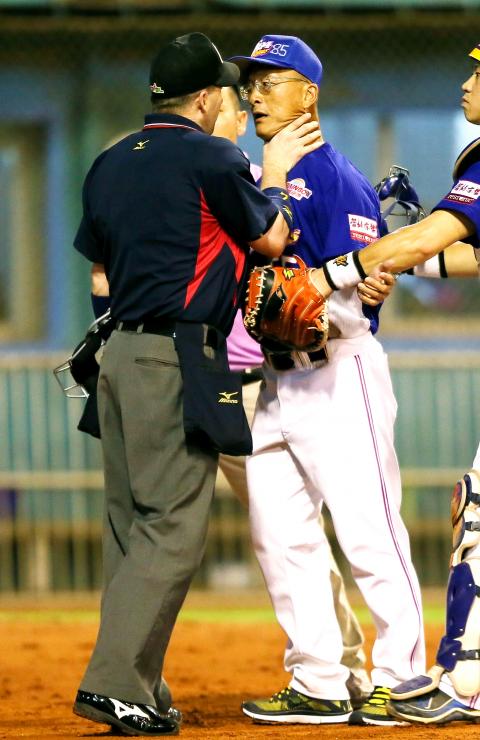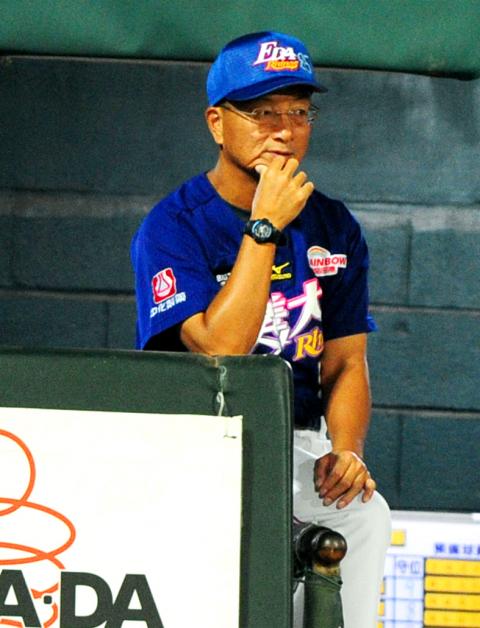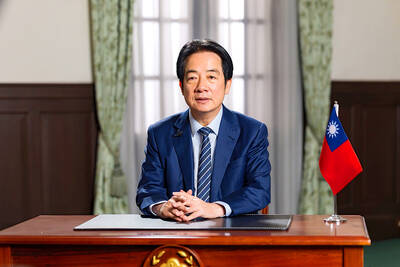Chinese Professional Baseball League (CPBL) umpire Brian Kennedy apologized in a telephone interview Sunday for putting his hand on the neck of a manager who bumped him after being ejected from a game last week. Kennedy told the Taipei Times his gut reaction at that moment was to keep the manager at arm’s length because he thought he was about to be punched.
“I one hundred percent regret the action of putting my hand up to his throat,” Kennedy, 38, said. “There’s no question about that. It is not professional, and I apologize to the team, to the league, to the fans, to my family, to everyone involved. This is not me. This is not how I operate.”
Kennedy, a North Carolina native who is serving a 10-game suspension, decided to break his silence about the Sept. 5 incident involving EDA Rhinos’ interim manager Huang Chiung-lung (黃煚隆), who as a player was suspended in 1993 for assaulting an American umpire, after reading “a lot of incorrect reporting” about their physical exchange.

Photo: Chang Chia-ming, Taipei Times
Apologetic
Kennedy, who said he is willing to meet with Huang to exchange apologies, maintains he did not grab Huang’s throat or choke him, but said he was just trying to prevent the situation from escalating further and to avoid getting hit.
“It’s really heart-wrenching that my four years in Taiwan come down to this particular incident,” Kennedy said. “Instigated by him, but again, not really handled correctly by myself, and I’m truly upset about this.”

Photo: Wang Yi-sung, Taipei Times
Reached by telephone in Arizona Sunday, John Lipsey, the American umpire attacked by Huang in 1993, said that although he had not seen the video, any umpire who is physically confronted by a player or coach should try to walk away.
“If you’re getting bumped, it’s tough,” Lipsey said. “You don’t want anyone touching you, and you don’t want to throw gas on the fire. I can understand how he might have done it, but you really can’t do it.”
Kennedy, in an e-mail Monday, elaborated on his reaction to Huang, saying, “Again, if I run away here, I will have lost all respect from any player, manager, coach, or front-office personnel, and even my fellow umpires from this league and any league I ever umpire for again.”
The CPBL declined to comment on questions about Kennedy, referring instead to a press release issued Sept. 6.
The incident, which was televised and whose video has gone viral on the Internet, began in the bottom of the fourth inning, during a game between the EDA Rhinos and Brother Elephants, when Kennedy called a balk on Rhinos pitcher Lin Chen-hua (林晨樺). After the runner on first was sent to second base, Huang and his translator are seen in the video approaching Kennedy, who was standing at home plate.
Lost in translation?
“He was yelling in Chinese as he was walking out,” said Kennedy, who does not understand Mandarin. “What I got from the interpreter was, ‘Why?’ ‘Why?’ ‘Why?’ or something to that effect, but also in a tone that was not really, I guess for lack of better term, respectful.”
Kennedy said he told the interpreter he would answer Huang’s questions, but said Huang first had to calm down.
“I couldn’t really understand the interpreter much because [Huang] would not stop,” he said.
Wanting to get the game started again, Kennedy said he told Huang and the interpreter he was done discussing the call. Kennedy can be seen in the video putting his mask back on and waiting near home plate as the interpreter speaks to Huang. Moments later, Kennedy can then be heard in the video telling the interpreter, “If he doesn’t leave now, I’m going to eject him.”
“Then the interpreter said, ‘Brian, he just wants to know what happened,’” Kennedy said. “That’s when I turned around again, and turned to the interpreter and said, ‘Look, he won’t stop yelling at me, I’m not going to explain the play unless he calms down. We’re done talking here.’”
Kennedy can then be heard in the video warning the interpreter again that Huang was close to being ejected, telling both men, “I’m turning my back,” in what Kennedy described as an attempt to deflect further confrontation and end the discussion.
You’re outta here
However, in a Sept. 7 story the Apple Daily translated Kennedy’s remark as: “You can only talk to my back. I’ll eject you if you say another word. (你只能跟我的背講話 、再說一句就趕你出去).”
Huang and the interpreter, however, remained on the field, while the interpreter continued speaking to Kennedy, the video shows. Kennedy said he issued Huang one more warning and then ejected him when he did not leave.
“After an ejection, I’m prepared for an argument, but not what occurred after that,” Kennedy said.
Arms outstretched, Huang walked over to Kennedy and bumped him with his chest, and Kennedy responded by raising his hand and placing it on Huang’s throat.
“My gut reaction was to get him at arm’s length away at first,” Kennedy said, adding he had been told before about Huang’s 1993 attack on Lipsey. “It wasn’t a thought process. I don’t really know why I put my hand up around his throat area.”
“It was an overall feeling that I was going to get hit.”
After the Rhinos’ catcher intervened, Kennedy can be seen in the video yelling briefly at Huang, then at the translator who Kennedy said told him Huang was trying to apologize before being ejected. Restrained by teammates who had cleared the bench, Huang continued to advance toward Kennedy, who in the video then walks up the third-base line away from the commotion.
Last week, Huang was quoted extensively in the Taiwanese media, including in one Sept. 7 Liberty Times (the Taipei Times sister newspaper) article in which he said, “I asked the translator to say that I apologize if my tone was not good, but please ask him to explain the [balk]. He didn’t say anything; he just ejected me. I can’t make heads or tails of it. I’ve never seen an umpire lay hands on someone like this before.”
It is unclear if and when the interpreter translated Huang’s apology into English. Kennedy said the interpreter had a very good command of English, but not of baseball terminology.
Kennedy, who said he is the only American umpire in the CPBL, said that in his four years officiating in Taiwan, he did not have a history with Huang, a base coach who became EDA Rhinos’ acting manager after Hsu Sheng-ming (徐生明) died suddenly of a heart attack last month.
Suspensions
Huang, who played under Hsu for the now defunct Wei Chuan Dragons (味全龍), was suspended with Hsu for three games in 1993 for attacking Lipsey, who called a game they were losing because of rain. Hsu was also fined NT$50,000.
For the Sept. 5 incident, Huang received a three-game suspension and a NT$60,000 fine, while Kennedy was suspended 10 games, fined NT$50,000 and demoted to the minor leagues for two weeks, according to a Sept. 6 press release issued by the league. Kennedy’s fine also covered his use of a cellphone during the fifth-inning maintenance break without obtaining permission from his supervisor, the statement said.
Kennedy, who cannot read Chinese, said he was unaware that league policy prohibits officials from using cellphones after arriving at stadiums, adding that he had never been furnished with an English version of league policy after repeated requests.
Contrary to reports in many Chinese and English-language publications, Kennedy said he did not phone the police, but did speak to them afterwards about potentially filing a complaint. He also said he called his wife, who is Taiwanese, to let her know he was okay, and an English-speaking league official.
“It’s the harshest sentence handed down, and I’m not sure why it was so heavy,” Kennedy said. “They told me it was because of my hand being on the throat, but they have expressed to me that they could tell I was trying to defend myself.”
Kennedy, who spent 10 years in the American minor leagues before being released from Triple A in 2008, said that in addition to the fine and suspension imposed by the CPBL, he has also been barred from working this year’s championship games, which he said he has officiated for the last three years.
He also said he doubts the league will rehire him next year.
“Well, I don’t think there is a lot I can do to work here again in Taiwan,” Kennedy said, adding he would stay if given the chance. “At least I have the opportunity to set the record straight that I am not a bad person, and that it didn’t happen how it was recorded.”
If Kennedy’s contract in Taiwan is not renewed, he said he will look for work umpiring American college baseball and will continue instructing at the Wendelstedt Umpire School, a prestigious officiating academy in Florida where he has taught since 2001.
Kennedy added, however, that he has already prepared himself for the unavoidable barrage of questions that will follow from students.
“It’s pretty much inevitable since the video has gone viral,” he said. “It can be an excellent tool and a learning session. We always preach walk away, and we will continue to harp on that.”
The Wendelstedt Umpire School did not return a voicemail by press time seeking comment.
Roughed up
John Lipsey cannot remember ever ejecting a coach or player during his one season as a Chinese Professional Baseball League umpire in 1993. So when players from the now defunct Dragons (味全龍) including EDA Rhinos’ interim manager Huang Chiung-lung (黃煚隆) pummeled him from behind after he ended a game because of rain, Lipsey was completely caught by surprise.
“The American guys from both teams came out and kind of came to my rescue,” he said in a telephone interview Sunday. “I kind of got punched around that night.”
Professional umpires in the US spend years, sometimes decades, in Triple-A baseball hoping for a shot at the major leagues. For some, like Lipsey and Brian Kennedy, who was suspended last week for putting his hand on Huang’s throat, that journey often includes detours to countries in Asia and Latin America.
“I was asked if I would like to do it since I was on the cusp of going to the big leagues at the time,” Lipsey said.
Lipsey never got that call, though, and retired from umpiring in 1995, capping a 12-year run that also took him to the Dominican Republic, where he said baseball was “intense.” Lipsey, like Kennedy, had been bumped in his career, but was never attacked the way he was in Taiwan, he said.
“It was an official game after five innings, and the Dragons were losing,” Lipsey recalled. “The field was not playable. There was lots of water, and then I called the game, which gave the other team the win. I think we were in the seventh inning. And then mayhem ensued.”
Part of that mayhem included then-Dragons’ player Huang punching Lipsey, which landed him a three-game suspension. His manager, Hsu Sheng-ming (徐生明), who suffered a fatal heart attack last month, was also suspended and fined NT$50,000. Since Lipsey was struck from behind, he could not make out his aggressors, he said.
Lipsey finished out his season in Taiwan without incident and headed back to the US to rejoin the Pacific Coast League, he said.
“I always tell everybody Taiwan was one of the safest places in the world,” he said. “Heck, you could walk around anywhere any time of night and not worry about it.”

This month the government ordered a one-year block of Xiaohongshu (小紅書) or Rednote, a Chinese social media platform with more than 3 million users in Taiwan. The government pointed to widespread fraud activity on the platform, along with cybersecurity failures. Officials said that they had reached out to the company and asked it to change. However, they received no response. The pro-China parties, the Chinese Nationalist Party (KMT) and Taiwan People’s Party (TPP), immediately swung into action, denouncing the ban as an attack on free speech. This “free speech” claim was then echoed by the People’s Republic of China (PRC),

Exceptions to the rule are sometimes revealing. For a brief few years, there was an emerging ideological split between the Democratic Progressive Party (DPP) and Chinese Nationalist Party (KMT) that appeared to be pushing the DPP in a direction that would be considered more liberal, and the KMT more conservative. In the previous column, “The KMT-DPP’s bureaucrat-led developmental state” (Dec. 11, page 12), we examined how Taiwan’s democratic system developed, and how both the two main parties largely accepted a similar consensus on how Taiwan should be run domestically and did not split along the left-right lines more familiar in

Many people in Taiwan first learned about universal basic income (UBI) — the idea that the government should provide regular, no-strings-attached payments to each citizen — in 2019. While seeking the Democratic nomination for the 2020 US presidential election, Andrew Yang, a politician of Taiwanese descent, said that, if elected, he’d institute a UBI of US$1,000 per month to “get the economic boot off of people’s throats, allowing them to lift their heads up, breathe, and get excited for the future.” His campaign petered out, but the concept of UBI hasn’t gone away. Throughout the industrialized world, there are fears that

The Democratic Progressive Party (DPP) controlled Executive Yuan (often called the Cabinet) finally fired back at the opposition-controlled Legislative Yuan in their ongoing struggle for control. The opposition Chinese Nationalist Party (KMT) and Taiwan People’s Party (TPP) acted surprised and outraged, but they should have seen it coming. Taiwan is now in a full-blown constitutional crisis. There are still peaceful ways out of this conflict, but with the KMT and TPP leadership in the hands of hardliners and the DPP having lost all patience, there is an alarming chance things could spiral out of control, threatening Taiwan’s democracy. This is no